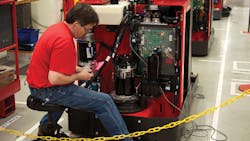2014 IW Best Plants Winner: The Raymond Corporation Chases Zero
The rigor of the Toyota Production System. A laser focus on meeting customer expectations. And a relentless drive to eliminate defects. These factors have lifted The Raymond Corporation to the top of the material-handling equipment business and earned the Greene, N.Y.-based manufacturer a 2014 IndustryWeek Best Plants Award.
Founded in 1922, the family-run forklift maker was bought by Toyota in 2000 and began installing its parent company’s celebrated production system in 2007. Raymond’s meticulous, deliberate implementation of the Toyota system took about three years to complete, and since then TPS has become Raymond’s bedrock and catapulted the company to remarkable success as its post-recession business has come roaring back.
At A GlanceThe Raymond Corp. Greene, N.Y. Primary Product: Forklift trucks Start-up Date: 1922 Achievements: In-plant defect rate reduced 75% over last three years; achieved on-time delivery rate of 99%; increased labor productivity by 13.4% over last three years |
"The Toyota Production System is the key to everything we do here," says Rick Harrington, Raymond’s vice president of U.S. Manufacturing "It motivates our people and helps them remember and continually recognize that everything we do is geared to our customer. If we can’t take care of our customer and surpass his expectations by giving him our highest-quality product, whether it’s a truck or one of our services, then we’ve failed."
Harrington says his co-workers’ embrace of TPS is Raymond’s most important advantage over its competitors because it "brings great urgency to resolve nagging issues, repeat issues."
"TPS really helps our whole team and all of the support groups get that same sense of urgency," he says. "In many factories, it’s easy to tell the difference between an ops guy and an engineer. But we try to use the Toyota Production System so you can’t tell the difference. The engineer has the same amount of urgency, the same amount of 'I gotta get this fixed because it’s impacting the line, it’s impacting the customer.’"
Raymond’s team uses an eight-step problem-solving method that incorporates "genchi" -- "go see" -- coupled with an array of visual tools to speedily assess and resolve defects and related production problems.
"What sets us apart from other companies is the amount of visualization we do, the amount of standardization we have around that visualization, and the energy we put into our efforts to remove defects and reduce warranty costs," says Dan Klassen, Raymond’s vice president of Quality and Program Management. "This is part of our DNA now -- this whole approach to how we visualize and attack problems."
Weak Point Management -- Raymond’s term for this system of relentless react-and-attack to eradicate defects -- doesn’t exist in a vacuum. TPS Manager Scott Campbell points out that Raymond augments the WPM system with a pre-emptive visualization scheme called Change Point Management that anticipates production changes that could create openings for new defects and nips them in the bud.
While the reactive approach of Weak Point Management is important, Campbell says, the management team also is taking a proactive approach to defect reduction. "We anticipate when defects could occur, and we manage against that," he says.
"It’s all about the defects," Campbell says. "Zero: That’s the goal."
About the Author
Pete Fehrenbach
Pete Fehrenbach, Associate Editor
Focus: Workforce | Chemical & Energy Industries | IW Manufacturing Hall of Fame
Follow Pete on Twitter: @PFehrenbachIW
Associate editor Pete Fehrenbach covers strategies and best practices in manufacturing workforce, delivering information about compensation strategies, education and training, employee engagement and retention, and teamwork. He writes a blog about workforce issue called Team Play.
Pete also provides news and analysis about successful companies in the chemical and energy industries, including oil and gas, renewable and alternative.
In addition, Pete coordinates the IndustryWeek Manufacturing Hall of Fame, IW’s annual tribute to the most influential executives and thought leaders in U.S. manufacturing history.
